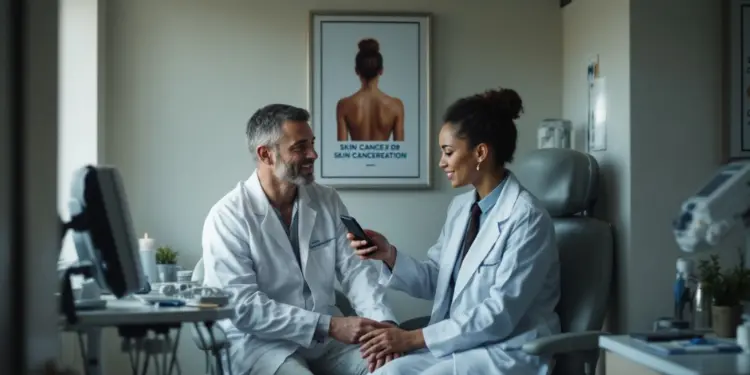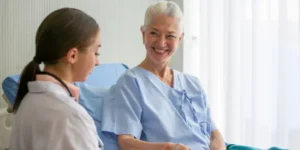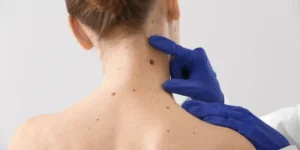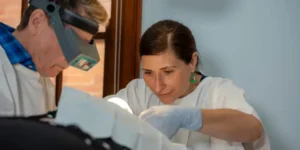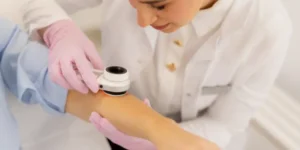Importance of Cancer Skin Checks at Skin : Cancer Council’s Recommendations
Concerned about skin cancer? You’re in the majority. Two out of every three Australians will encounter this health issue in their lifetime. This blog highlights the necessity of skin cancer checks and how they can be lifesaving.
Continue reading for further insight.
Key Takeaways
- Two out of three Australians may face skin cancer. Early checks can treat almost all cases.
- Look for moles that change in shape, colour, or size. It’s a sign of melanoma.
- People who had skin cancer or have fair skin should check more often.
- Basal Cell Carcinoma and Squamous Cell Carcinoma are common but Melanoma is very serious.
- Skin Cancer Hub says to use special clinics for better chances to find cancer early.
Importance of Regular Skin Cancer Checks

Regular skin cancer screenings have the potential to preserve lives. Skin cancer is a prevalent condition among Australians. Medical professionals state that early detection allows for nearly all instances to be treatable.
It’s recommended that individuals frequently consult with a doctor for skin examinations. This strategy aids in detecting the disease prior to progression.
According to Skin Cancer Hub, conducting self-examinations is beneficial as well. They suggest enlisting the help of a specialist for comprehensive check-ups. This approach safeguards your skin from sun damage and quickly identifies any issues.
A brief consultation can significantly contribute to maintaining health and early cancer prevention.
Early Detection of Skin Cancer
Transitioning from the requirement for routine inspections, it’s evident that early detection of skin cancer is crucial. The numbers speak volumes: early identification of skin cancer can be life-saving, with approximately 95% of instances treatable when discovered promptly.
This highlights the immense significance of timely detection.
Skin Cancer Hub recommends being alert for new moles or skin alterations. UV radiation is the culprit for over 95% of skin cancers, hence adopting sun-safe behaviour can be beneficial.
Prompt identification of melanoma improves the probability of overcoming it. This emphasises the integral role that examinations play in combating skin cancer.
Key Signs to Watch For
Looking for key signs of skin cancer is vital. It helps catch it early when it’s easier to treat. Here are the important signs:
- Look at the shape. If one half does not match the other, that’s a red flag.
- Check the edges of moles or spots. Uneven, notched, or scalloped edges mean you should see a doctor.
- Watch for different colours. Moles with several colours or shades might be a problem.
- Size matters too. A spot larger than 6 mm across needs attention.
- Notice changes over time. Any spot that grows or changes in shape, colour, or height is worrying.
- Bleeding or itching is also a sign to take seriously.
These points are based on the ABCDE guide: Asymmetry, Border, Colour, Diameter, and Evolving. They help us catch melanoma early on.
High-Risk Groups
After learning how to spot skin cancer signs, it’s key to know who faces the most risk. Some people are more likely to get skin cancer than others. If you had skin cancer before, your risk is higher.
People with fair skin or lots of moles also face more danger. Those who work outside spend more time in the sun, so they have a bigger chance of getting skin cancer.
If you’re in these groups, checks are extra important. Skin Cancer Hub says staying safe means being smart about risks and acting fast if you see changes. Protecting your health starts with knowing where you stand and taking steps to keep your skin safe every day.
Types of Skin Cancer
Skin cancer comes in several types. The most common are Basal Cell Carcinoma (BCC) and Squamous Cell Carcinoma (SCC). They start from skin cells. BCC grows slowly and is the most common.
It’s less likely to spread to other parts of the body. SCC is also quite common but can grow quickly if not treated right away.
Melanoma is another type, known for being more serious than BCC or SCC. It starts in melanocytes, the cells that give skin its color. Melanoma can spread fast to other organs if it’s not caught early.
This makes checking your skin regularly very important to catch any signs as soon as possible for all these types of skin cancer.
Benefits of Professional Skin Cancer Clinics
Going to professional skin cancer clinics offers big benefits. Experts at these clinics can spot skin cancer early. This means you have a better chance of getting well soon. At Skin Cancer Hub, you get help from doctors who know a lot about skin cancer.
They use special tools for checking and finding melanoma.
These places also have ways to examine your moles. If something looks wrong, they catch it fast. Treatment starts quicker this way.
Skin Cancer Hub has equipment for detailed checks and experts ready to guide you through prevention and treatment steps.
Finding a Skin Cancer Clinic Near You
Finding a skin cancer clinic is easy. Start by searching online for local options. Look for clinics that offer skin cancer screening and examination services. Check reviews to find a trusted place.
You can also ask your doctor for recommendations. They may know specialists in your area. It’s important to choose professionals who provide accurate diagnoses and effective treatment options.
Skin Cancer Hub is a great resource for information on clinics near you. Make sure to act quickly if you notice any unusual spots or changes on your skin.
Supplementary insights on Skin Cancer Checks
Skin cancer checks are important for everyone. You can learn how to check your skin at home and what to expect during a clinic visit.
How to Perform a Self-Examination
Self-examinations are essential for your skin health. They assist in identifying changes promptly. Follow these steps to perform a self-examination:
- Find a well-lit area. Use natural light if possible.
- Remove all clothing, except for your underwear.
- Use a full-length mirror to check the front and back of your body.
- Check each arm and hand carefully. Look at palms and fingernails too.
- Check your face, including ears, nose, and lips.
- Examine your neck and scalp using a handheld mirror or smartphone camera.
- Sit down to inspect your legs and feet closely.
- Look between your toes and under your nails.
- Pay attention to moles or spots that change size, shape, or colour—use the ABCDE guidelines:
- A: Asymmetry
- B: Border irregularity
- C: Colour variation
- D: Diameter larger than 6mm
- E: Evolving over time
- Note any new spots or growths on the skin.
Regular checks can lead to early detection of skin cancer, especially melanoma… Assess any suspicious changes promptly with a dermatologist for further evaluation at a professional skin cancer clinic like Skin Cancer Hub. Timely action can save lives!
What to Expect During a Clinic Visit
During your visit to a skin cancer clinic, a qualified professional will examine your skin. They will look for any concerning spots. Here’s what you can expect:
- Check-In Process
You’ll arrive and check in at the front desk. Bring any medical records if you have them.
- Initial Consultation
A nurse or technician may ask about your medical history. Share any concerns or changes you’ve noticed on your skin.
- Thorough Examination
The dermatologist will inspect your skin closely. They might use a special tool called a dermatoscope for better visibility.
- Skin Spot Inspection
Expect the doctor to examine all parts of your body, even areas you might not think of, like behind your ears or between toes.
- Discussion of Findings
After the inspection, the doctor will discuss their findings with you. They’ll explain if they find anything unusual.
- Skin Biopsy Consultation
If needed, they may suggest a biopsy for further testing. This is a simple procedure to take a small sample of tissue.
- Recommendations for Care
The dermatologist may recommend treatments or follow-up visits based on what they find during the examination.
- Questions Welcomed
You can ask questions throughout the visit. It’s important to understand everything about your skin health evaluation.
- Follow-Up Appointments
Depending on results, scheduled follow-up appointments may be necessary for ongoing monitoring and care.
- Professional Advice Given
Expect clear instructions on skincare after the visit and how often you should return for checks in the future.
Your time at the clinic is essential for early detection and prevention of skin cancer—take it seriously!
Frequently Asked Questions about Skin Cancer Checks
Skin cancer checks are important for everyone. Many people have questions about them. Here are some common ones:
- How often should I get checked?
Adults should have a skin check at least once a year, especially if they have moles or sunspots.
- What happens during a skin check?
A doctor examines your skin for any changes. They will look closely at moles and other spots.
- What signs should I look out for?
Watch for changes in size, shape, or colour of moles. Look for new growths or sores that do not heal.
- Can I check my skin at home?
Yes! Regular self-examinations help you spot changes early. Check your body monthly and keep an eye on any unusual marks.
- Do skin checks hurt?
No, they are usually painless. The doctor might use a dermatoscope to see small details better.
- How can I find a clinic near me?
Search online or ask your GP for recommendations on local clinics that focus on skin health assessments.
- What if the doctor finds something suspicious?
If there’s concern, they may suggest further tests or a biopsy to check if it is cancerous.
- Are there risks with too many checks?
Too many unnecessary checks can cause anxiety but catching issues early is crucial.
- Should children get checked too?
Children should be examined if they have fair skin or family history of skin cancer.
- Why shouldn’t I rely on apps?
Skin cancer detection apps are unreliable and cannot replace professional evaluations by dermatologists.
These answers can guide you in taking care of your skin health through regular exams at professional clinics like Skin Cancer Hub.
Recommendations from the Cancer Council
The Cancer Council advises regular skin checks to catch cancer early. They recommend using SPF 50+ sunscreen daily. Wear protective clothing and hats, too. Sunglasses protect your eyes from UV rays.
For local sun safety, download the free SunSmart Global UV App. This app shows you when to seek shade or apply more sunscreen. Healthdirect offers approved health info about skin cancer and prevention tips.
Stay informed on how to stay safe in the sun!
Comprehensive Skin Cancer Checks in Brisbane
Skin cancer is one of the most prevalent forms of cancer in Australia, making regular checks essential. At Skin Cancer Hub, we provide a comprehensive skin cancer clinic service to help detect and manage potential issues early. This blog explains why regular checks are vital, what to expect during your visit, and how we use advanced technology to safeguard your skin health.
Why Trust Skin Cancer Hub?
At Skin Cancer Hub, our team is trained in identifying and managing skin cancer. With a focus on early skin cancer detection, we use advanced tools to spot lesions that may not be visible to the naked eye. Our patient-first approach ensures you feel comfortable and informed every step of the way.
Why Is Early Detection Crucial?
Skin cancer progresses quickly, particularly in Australia’s sunny climate, increasing the risk for many Australians. Early detection significantly improves treatment success rates, making regular checks a cornerstone of skin health. By identifying suspicious lesions early, we can recommend timely and effective interventions.
What Is a Full Body Skin Exam?
A full body skin exam involves a thorough check of your skin from head to toe. This exam identifies changes, including moles or lesions that appear abnormal. It’s particularly useful for individuals with a high skin cancer risk, such as those with a family history or extensive sun exposure.
What Should You Know About Skin Cancer Risk?
Living in Brisbane increases your exposure to UV radiation, one of the primary causes of skin cancer. Australians are advised to use sun protection daily and undergo an annual skin exam. Regular screenings are crucial for managing skin thoroughly and preventing complications.
How Do We Identify Suspicious Moles and Lesions?
Using hand-held dermatoscopes and advanced digital technology, we inspect your skin for signs of cancer. This includes identifying suspicious moles, lesions with irregular shapes, or colours that stand out. We may also recommend total body photography for a comprehensive baseline.
How Does Technology Enhance Diagnosis?
Our clinic utilises the latest in diagnostic technology, including digital dermoscopy, which allows us to capture high-resolution images of your skin. This technology is particularly useful for tracking changes in moles or lesions over time, ensuring no subtle changes go unnoticed.
When Should You Seek a Skin Cancer Screening?
We recommend scheduling a screening if you notice any changes in your skin, such as a growing mole or a lesion that doesn’t heal. These can be signs of skin cancer and should be evaluated promptly. For optimal care, aim for a yearly skin cancer screening.
How Do We Manage Skin Cancer Treatment?
For suspicious lesions, we offer a variety of treatments, including cryotherapy for small growths or surgery for more complex cases. Our team ensures the effective management of skin cancer, tailoring solutions to each patient’s needs.
Comparison Table: At-Home Checks vs. Professional Skin Exams
| Criteria | At-Home Checks | Professional Skin Exams |
|---|---|---|
| Detection Accuracy | Limited, relies on the naked eye | High, with advanced technology |
| Skin Thoroughness | Surface-level observation | Comprehensive, full body exam |
| Expertise | None | Trained dermatologists |
| Management Options | None | Includes cryotherapy, surgery |
How to Book a Skin Cancer Screening?
Booking an appointment with Skin Cancer Hub is simple. Contact us to arrange a comprehensive skin exam tailored to your needs. Our trained professionals will ensure you receive the best care and guidance.
Conclusion
Skin cancer can be life-threatening if left undetected. Regular checks, particularly in Brisbane’s sun-drenched climate, are essential for early detection and effective treatment. Trust Skin Cancer Hub for professional, thorough, and reliable screenings. Protect your health—contact us today to book your appointment and ensure peace of mind.
Key Takeaways
- Regular skin cancer screenings are essential for early detection.
- A full body skin exam helps identify suspicious lesions that may not be visible to the naked eye.
- Advanced digital technology enhances accuracy and provides long-term tracking.
- Skin cancer is highly treatable with early intervention—don’t delay your check.
- Contact Skin Cancer Hub for trusted, professional care in Brisbane.
Conclusion
Regular skin checks save lives. They help identify skin cancer early when it is easier to treat. Skin Cancer Hub recommends visiting clinics for a professional check-up. Familiarise yourself with your skin and notice changes.
Safeguard yourself by staying informed and taking action—your health matters!
FAQs
1. Why are skin checks important at cancer clinics?
Skin checks help find skin cancer early. Early detection can save lives. Clinics follow Cancer Council’s recommendations for thorough checks.
2. How often should I get a skin check?
It’s best to have regular skin checks, especially if you have risk factors like fair skin or a family history of skin cancer. Consult your doctor for personal advice.
3. What happens during a skin check?
During a check, the doctor looks closely at your skin for any unusual spots or changes. They may take pictures or notes to track changes over time.
4. Can I do my own skin check at home?
Yes, you can! Regular self-checks are good but don’t replace professional ones at clinics. Follow Cancer Council’s guidelines on what to look for and when to see a doctor.

